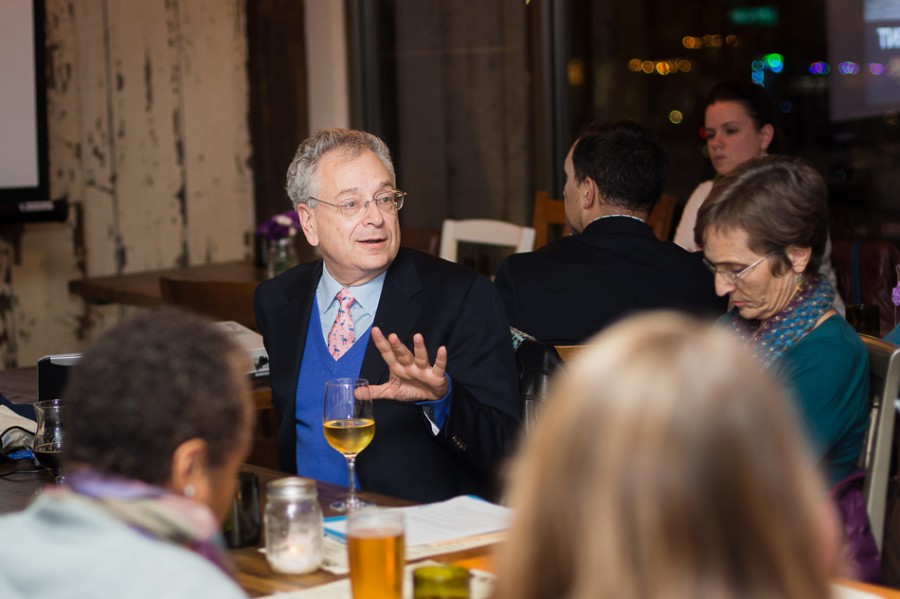Environmental professional talks sustainable transit-oriented development
Scott Bernstein, co-founder of the Center for Neighborhood Technology, speaks to Chicago area residents about transit-oriented development, or urban development based around public transportation, at Farmhouse Evanston. The symposium about sustainability launched in May 2011 in collaboration with Citizens’ Greener Evanston.
October 29, 2014
A sustainability professional spoke to residents of Evanston and other suburbs about transit-oriented development Sunday night at a sustainability symposium.
Scott Bernstein (Weinberg ’74) spoke at Farmhouse Evanston, 703 Church St., as part of the Citizens’ Greener Evanston’s Green Drinks symposia program, which is an effort to get city residents thinking about ways to live more sustainably. Bernstein co-founded the Center for Neighborhood Technology, an innovations laboratory for urban sustainability.
CGE is working to bring Evanston’s greenhouse gas emissions down 20 percent by 2016, CGE board member Rory Nicholson said.
“While we’ve gotten our emissions down by 13 percent through switching power sources to energy from renewable resources, the rest of it is going to come from behavior change,” Nicholson said.
Bernstein, an Evanston resident, works closely with CGE to advocate for this behavior change through making sustainable, transit-oriented choices in urban spaces.
“Transit-oriented development is built for people, not cars,” Bernstein said. “A lot of development is built for cars, though, and we need to start asking, ‘What does that cost us?’”
Bernstein’s talk focused on parking in downtown Evanston. He said city laws call for between one-and-a-half and two parking spaces per housing unit, costing the contractor from $4,200 to $37,000 each, not including the spaces’ maintenance costs or the loss in revenue for the use of that space.
Instead, Bernstein said, minimum parking space requirements should be waived. He praised a new system in San Francisco that made developers petition to have any parking spaces added to their projects, rather than requiring that they build a minimum number.
“Evanston is still one of the most transit-friendly suburbs in the United States, but people are coming for the transit and still bringing their two cars,” Bernstein said. “Evanston gets away with this progressive image, but it’s not, really.”
Attendees, including members of CGE, local small business owners and other sustainability advocates from the Chicago area, said they were surprised by Bernstein’s figures.
“I don’t think people realize the impact of all this wasted space,” said CGE board member Bill McDowell. “I was shocked by his numbers on parking costs.”
Bernstein also talked about car- and bike-sharing programs, both nationally and in the Chicago area. He co-founded the car-sharing program IGO with another CGE board member, a program that grew to 15,000 cars shared by 250 members before selling it to Enterprise Rent-A-Car.
“Eighty-seven to 95 percent of the time, cars are sitting around unused,” Bernstein said. “It’s kind of silly. It’s an idle asset.”
By moving toward car- and bike-share programs, as well as public transportation, Bernstein said he hopes Evanston will be able to more effectively use its space and environmental resources.
“We really need a level of coordination around transportation,” Bernstein said. “Cities only thrive if they use their assets.”
The next Green Drinks event will take place Nov. 12 at Farmhouse, when Gail Schechter of Open Communities and Lin Ewing of the North Shore-Barrington Association of Realtors will discuss affordable housing.
Email: [email protected]
Twitter: @MadelineFox14


